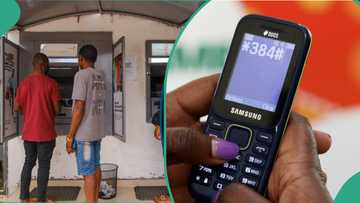Fake Credit Alerts: Banks Warn Customers to Beware, Give Tips to Confirm Transactions
- Nigerian banks have warned their customers to beware of the rise of fake bank alerts and take extra measures to confirm transactions
- The banks, in several emails, state that with the rise in fraud cases, it is no longer sufficient to depend on SMS or email notification
- They share tips for customers to confirm all transactions using specified channels before rendering services or releasing goods
Legit.ng journalist Ruth Okwumbu-Imafidon has over a decade of experience in business reporting across digital and mainstream media.
Nigerian commercial banks have cautioned their customers about an increase in fake bank alerts, a method commonly employed by scammers to trick individuals and businesses.
This was contained in several statements from different banks made available to the press.
The banks noted that these fake alerts are designed to appear like legitimate notifications of deposits or transfers, causing recipients to think they have received said sum.

Read also
Relief for customers as MTN, Glo, and 9mobile will no longer disconnect 9 banks’ USSD codes today

Source: UGC
Victims then unknowingly supply goods or services without confirming the payment, only to discover later that the funds were never actually sent into their accounts.
This issue has become more widespread as digital transactions continue to rise in the face of cash scarcity. Banks and regulatory bodies in Nigeria have consistently urged the public to stay alert and report any suspicious activities right away.
Daily Sun reports that Access Bank also sent an email warning customers to beware of fake alerts.
In its mail, the bank urged customers not to rush to deliver goods and services after receiving an SMS or email notification. The tier-one bank advised customers to take extra steps to confirm the funds using secure banking channels like the USSD code—*901*—internet banking platform or Access More.
Rise in incidents of fake alerts
Fraudulent activities have surged dramatically, particularly during the first nine months of 2024, putting both banks and customers at increased risk.
FITC's Fraud and Forgery report for Q3 2024 reveals a 65% surge in fraud cases reported by banks for the quarter. The figure rose to 19,007 in Q3 2024, from 11,532 the previous quarter.
It gets even more troubling as the monies involved in attempted fraud cases from banks doubled, going from N56.6 billion in Q2, 2024 to N115.9 billion in Q3, 2024.
CBN issues warning on fake alerts
This surge in fraud prompted the Central Bank of Nigeria (CBN) to issue a warning, urging Nigerians to be cautious of counterfeit SWIFT documents being used to support such claims.
The central bank revealed that it has received numerous complaints from private companies, individuals, law firms, and government agencies, all reporting that foreign funds sent to their accounts have not been credited.
The bank pointed out that many of these complaints are accompanied by fraudulent SWIFT MT103 forms and acknowledgement copies that cannot be authenticated on the SWIFT network, suggesting that the supposed transfers never occurred.
How to spot fake alerts
In related news, Legit.ng shared how Nigerians can spot fake bank credit alerts, and differentiate them from genuine notifications.
The scammers often exploit loopholes in the banking system, using mobile applications like "Flash fund" or "Flash alert" apps, which they install on their smartphones.
With these apps, they prey on unsuspecting victims, mimicking authentic banking application interfaces to create fake transaction alerts.
To spot it, a customer must first look for the sender's details, including the bank name and logo. The customer must also verify transactions using bank mobile applications or USSD channels.
PAY ATTENTION: Сheck out news that is picked exactly for YOU ➡️ find the “Recommended for you” block on the home page and enjoy!
Source: Legit.ng



